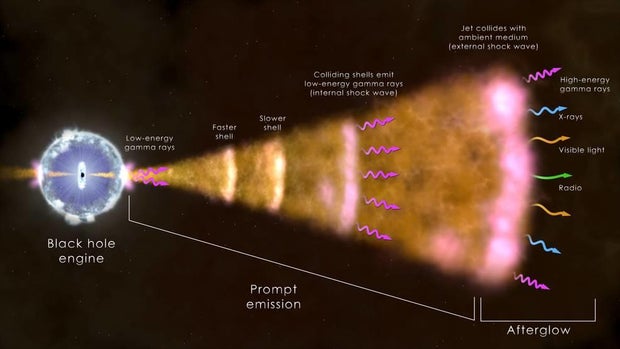Photo shows star about to become supernova
NASA astronomers recently spotted a burst of radiation that was quickly crowned the "BOAT": the brightest of all time.
The source of the radiation, which NASA said "swept through the solar system" on Oct. 9, 2022, was a gamma-ray burst, the most powerful kind of explosion. NASA said in a news release that the gamma-ray burst triggered spacecraft detectors. Researchers and astronomers around the world have spent the past several months looking at and understanding the burst, which was so bright that it "effectively blinded" most space instruments used to measure such bursts, NASA said.
Information about the burst was reconstructed using data from astronomer in the United States. That analysis was compared with observations from Russian and Chinese astronomers. The data shows that the burst was "70 times brighter than any yet seen," NASA said.
Eric Burns, an assistant professor of physics and astronomy at Louisiana State University in Baton Rouge, said that this was "likely" the brightest such burst "since human civilization began." His research, which analyzed more than 7,000 gamma-ray bursts, found that these events only occur once every 10,000 years.
The signal from this burst, experts found, had been traveling for about 1.9 billion years before reaching Earth.
"Astronomers think these bursts represent the birth cries of black holes formed when the cores of massive stars collapse under their own weight. As it quickly ingests the surrounding matter, the black hole blasts out jets in opposite directions containing particles accelerated to near the speed of light," NASA said. "These jets pierce through the star, emitting X-rays and gamma rays as they stream into space."
Astronomers are now watching for a supernova, which typically occurs within a few weeks of this type of gamma-ray burst. The supernova still hasn't been seen, which may be because of the location of the explosion: The gamma-ray burst appeared in a part of the sky that has thick dust clouds which can dim light.
"We cannot say conclusively that there is a supernova, which is surprising given the burst's brightness," said Andrew Levan, a professor of astrophysics at Radboud University in Nijmegen, Netherlands, in NASA's news release. Levan is using multiple data sources to study the area. "If it's there, it's very faint. We plan to keep looking, but it's possible the entire star collapsed straight into the black hole instead of exploding."

The gamma-ray burst has also given astronomers the opportunity to study the jets that appeared in its wake and distant dust clouds that were illuminated by the burst, and consider what NASA called a "big cosmic question."
"We think of black holes as all-consuming things, but do they also return power back to the universe?" asked Michela Negro, an astrophysicist at the University of Maryland, Baltimore County, and NASA's Goddard Space Flight Center in Greenbelt, in the agency's news release.
Answers to that, NASA said, will take more time. A second team is studying measurements similar to the one Negro's team took, but it may be possible to show that the burst was powered by the energy of a magnetic field.
Thanks for reading CBS NEWS.
Create your free account or log in
for more features.


